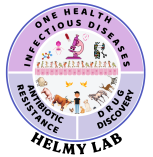A central focus of our lab is understanding how the host microbiome influences the behavior of pathogens and immune responses. We study the dynamic interactions between beneficial microbes, invading pathogens, and host cells to uncover mechanisms that drive disease susceptibility or resistance. Our research investigates how commensal and probiotic strains influence immune signaling, enhance barrier functions, and compete with pathogens for niches and nutrients. Through transcriptomic, metabolomic, and functional assays, we analyze host cellular responses to infection and probiotic treatment. We also use advanced in vitro models, including enteroids, to mimic host–microbe interactions under physiologically relevant conditions. This work informs the development of microbiome-targeted therapies and supports the design of interventions that leverage beneficial microbes to prevent infection.
